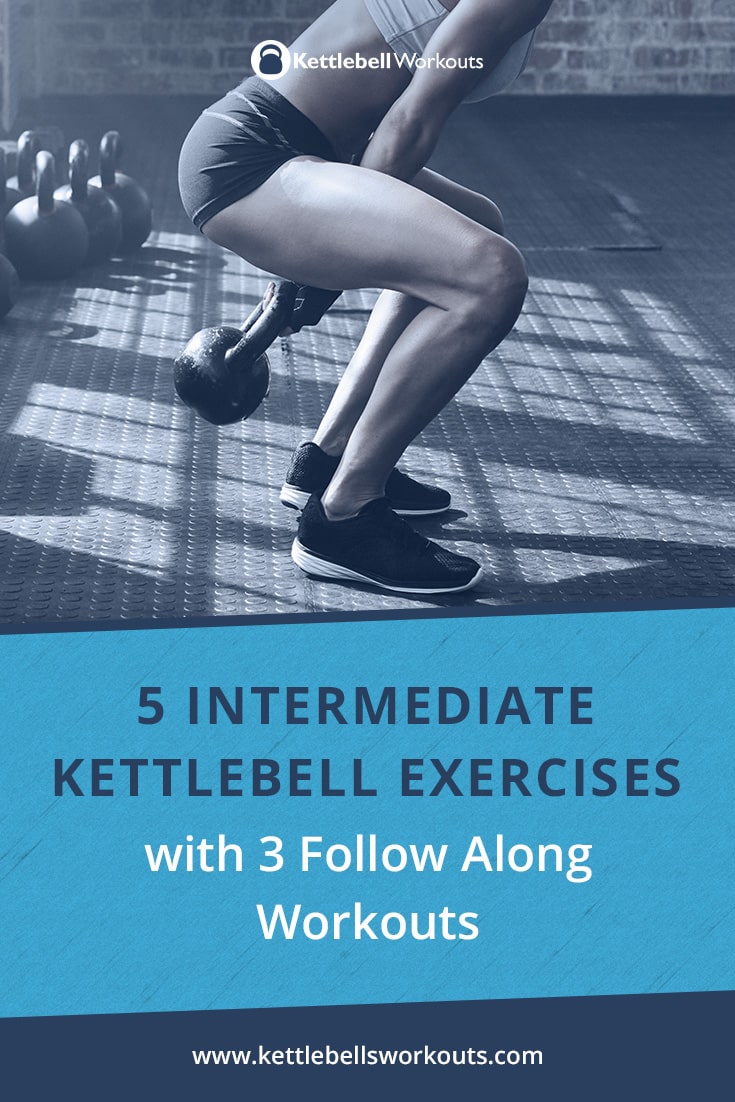
Once you have mastered the 5 beginners kettlebell exercises then you can begin to take your kettlebell training to the next level with these 5 intermediate kettlebell exercises.
Building a solid kettlebell foundation with the beginners exercises is important to condition your tendons and ligaments which are heavily influenced during the dynamic kettlebell movements listed below.
OK, lets get started…
1. Kettlebell Swing Variations
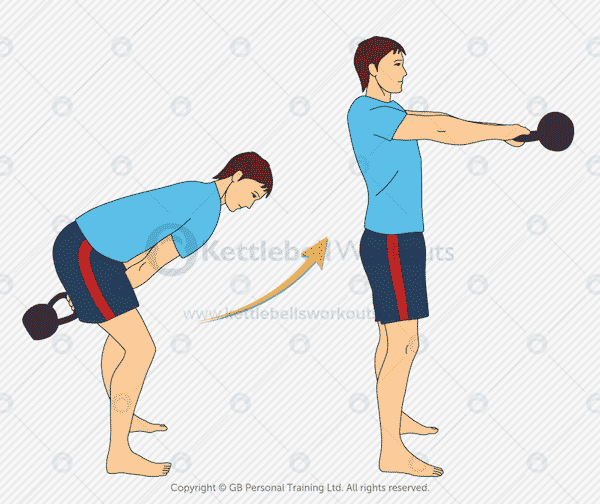
The kettlebell swing is one of the most important kettlebell exercises and uses almost every muscle in the body.
The kettlebell swing is a progression on from the kettlebell single handed deadlift exercise.
If your goals are fat loss, developing full body strength and also improving your cardio without moving your feet, then the kettlebell swing is a must.
There are 3 fundamental kettlebell swing variations:
- Two Handed Kettlebell Swing
- One handed Kettlebell Swing
- Alternating Kettlebell Swing
These kettlebell swing variations should be mastered in the above order as they do get progressively more challenging.
As a general guide, once you can swing the kettlebell for 60 seconds with two hands you can then progress on to the one handed swing.
Learn more: 4 steps to master the kettlebell swing
To see more posts about general kettlebells workouts and advice, go here.
Watch a video of the kettlebell two handed swing below:
Practice: start with 10 reps of the two handed swing, rest for 30 seconds and repeat. Work up to 60 seconds non stop.
2. Kettlebell Clean
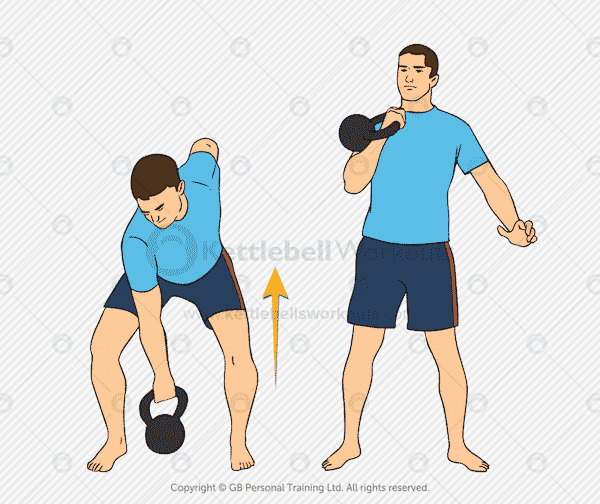
The kettlebell clean takes the kettlebell from the floor and explosively elevates it into the racked position against the chest.
Again the kettlebell clean is based off the deadlift movement pattern so the single arm deadlift must be mastered first.
Similar to the kettlebell swing the kettlebell clean uses most muscles in the body, in particular the legs, hips and back.
With practice and as your skills improve you will start to add a press into the top part of the movement to complete the full kettlebell clean and press exercise.
Discover more: Stop banging your wrists and clean like a pro
Watch a video of the kettlebell clean below:
Practice: begin with 5 reps on each side and work up to 60 seconds on each side non stop. Great cardio drill.
3. Kettlebell Reverse Lunge
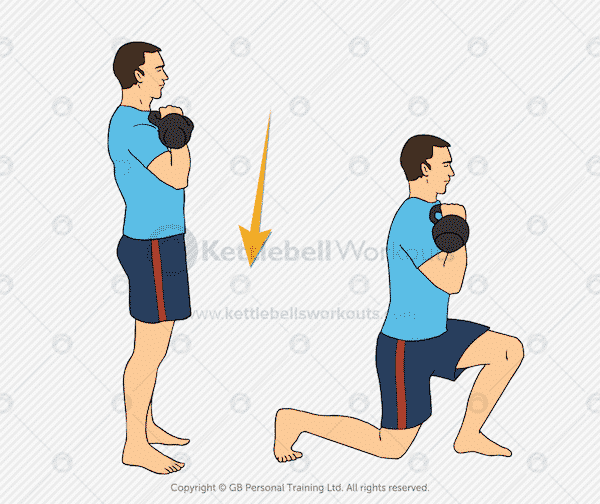
Once you are strong with the kettlebell squat then the kettlebell lunge is the next logical progression.
The kettlebell lunge is great for: mobility of the hips, the perfect exercise for many sports, develops excellent single leg strength, and is a great full body fat loss exercise.
The kettlebell reverse lunge is the best starting lunge variation followed by the kettlebell forward lunge.
It is very important that the rear knee kisses or almost kisses the floor in order to fully activate the buttock muscles.
Learn more: 16 kettlebell lunge variations for strong legs and buttocks
Watch a video of the kettlebell reverse lunge below:
Practice: start without the kettlebell to get used to the movement. When you can complete 20 alternating repetitions then add a kettlebell holding it in the racked position. Goal 12 reps on each side.
4. Kettlebell Turkish Get Up
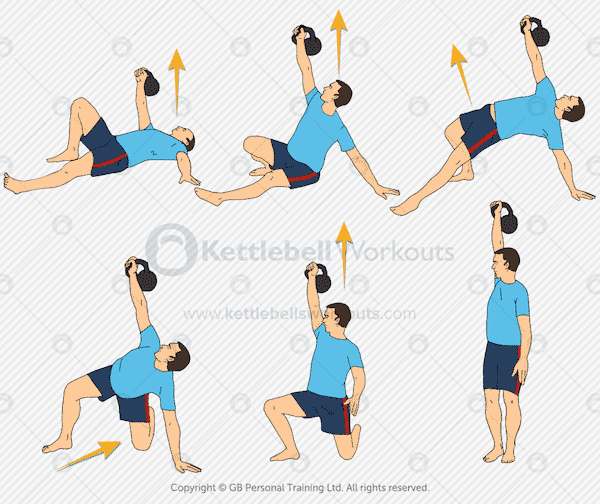
The kettlebell turkish get up is a complicated exercise to learn but well worth your time.
The get up is a strong conditioner of the stabilising muscles of the body making it excellent for injury prevention.
You will also improve your full body joint mobility with this exercise as well as working deep into the core muscles.
The kettlebell turkish get up serves as an excellent assessment tool so you can see where your weaknesses lie and if performed correctly help you to overcome them.
Learn more: Ultimate guide to the kettlebell Turkish get up
Watch a video of the kettlebell turkish get up below:
Practice: begin by getting used to the movement without using a kettlebell. Next, try the movement holding a glass of water. Finally, add a kettlebell and practice changing hands after each repetition. Goal is 10 total reps.
5. Kettlebell Row
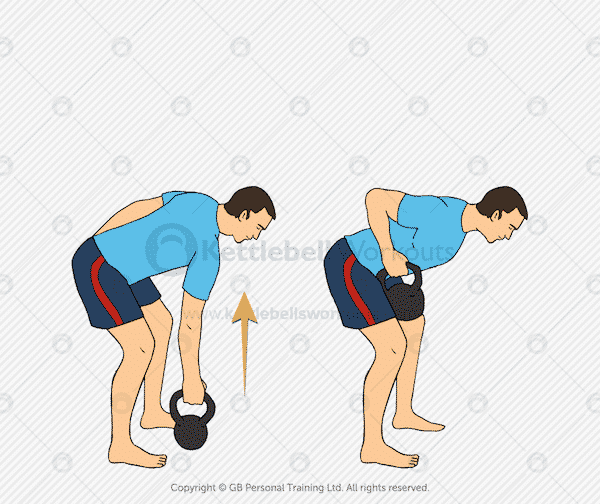
The kettlebell row is another big full body exercise that targets into the back muscles but also requires a strong core and legs to maintain good position.
The kettlebell is rowed towards the body as if the elbow is being pulled by a piece of string.
It is very important to keep the core muscles tight and the lower back nice and flat even when you start to fatigue.
Beginners can practice the exercise by placing their hand on an exercise ball or bench in order to master the body position first.
Want more? 6 kettlebell row variations for a strong back and core
Watch a video of the kettlebell row below:
Practice: work up to 12 unassisted repetitions on each side with a nice strong flat back.
4 Minute Kettlebell Circuits for Intermediates
Now that we have the 5 intermediate kettlebell exercises we can start putting them together into effective workouts.
Below I’ve listed 3 short circuits and 3 videos that you can follow along with me and practice.
I suggest that you practice just 1 x 4 minute circuit to begin with and as your strength and movement skills improve increase it to 3 total circuits with 30 – 60 seconds rest in between each one.
Woman should start with an 8kg (18lbs) or 12kg (25lbs) size kettlebell.
Men should start with a 12kg (25lbs) or 16kg (35lbs) size kettlebell.
Perform a workout 3 – 5 times per week.
Kettlebell Workout 1
- Half Get Up – left x 5 reps
- Half Get Up – right x 5 reps
- Two Handed Swing x 30 reps
- Slingshot – change every 5 x 20 reps
- Goblet Squat x 20 reps
- Halo – alternating x 10 reps
Watch the 4 minute kettlebell circuit No. 1:
Kettlebell Workout 2
- Reverse Lunge – left x 10 reps
- Reverse Lunge – right x 10 reps
- Two Handed Swing x 30 reps
- Racked Squat – left x 10 reps
- Racked Squat – right x 10 reps
- Half Get Up – left x 5 reps
- Half Get Up – right x 5 reps
Watch the 4 minute kettlebell circuit No. 2:
Kettlebell Workout 3
- Clean – left x 10 reps
- Clean – right x 10 reps
- Reverse Lunge – left x 10 reps
- Reverse Lunge – right x 10 reps
- Regular Row – left x 8 reps
- Regular Row – right x 8 reps
- Two Handed Swing x 30 reps
Watch the 4 minute kettlebell circuit No. 3:
Conclusion of 5 Kettlebell Exercises for Intermediates
Above I’ve listed 5 intermediate kettlebell exercises which I believe everyone should practice once they have mastered the 5 basic kettlebell exercises.
Swinging and moving a kettlebell dynamically uses a great deal of muscle, tendon and ligament strength so please make sure you are great at the beginners exercises before moving on to these ones.
You will find it really helpful to follow along with the 3 kettlebell workouts above so you can master not only the exercises but also the tempo and breathing too.
Best of luck!
Get all 50 of these 4 minute kettlebell workouts CLICK HERE
FAQ
There are at least 50 quality kettlebell exercises, the most popular include the swing, Turkish get up, goblet squat, snatch, renegade row and windmill.
Using kettlebells can improve your endurance, strength, stability, cardio, power, and balance. The Journal of Strength and Conditioning Research stated that kettlebell training can also lead to a healthier lower back.
This always depends on your physical attributes and your goals. Kettlebell swings, goblet squats and the Turkish get up are great exercises.



Leave a Reply